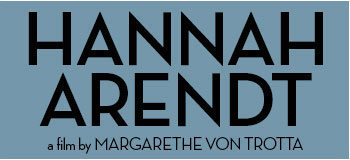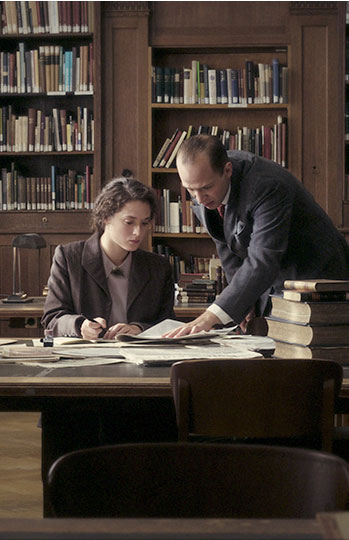Hannah Arendt BARBARA SUKOWA
Heinrich Blücher AXEL MILBERG
Mary McCarthy JANET McTEER
Lotte Köhler JULIA JENTSCH
Hans Jonas ULRICH NOETHEN
Kurt Blumenfeld MICHAEL DEGEN
William Shawn NICHOLAS WOODESON
Lore Jonas SASCHA LEY
Charlotte Beradt VICTORIA TRAUTTMANSDORFF
Martin Heidegger KLAUS POHL
Young Hannah Arendt FRIEDERIKE BECHT
Frances Wells MEGAN GAY
Jonathan Schell TOM LEICK
Thomas Miller HARVEY FRIEDMAN
Director MARGARETHE VON TROTTA
Screenwriters PAMELA KATZ and MARGARETHE VON TROTTA
Cinematographer CAROLINE CHAMPETIER
Editor BETTINA BÖHLER
Producers BETTINA BROKEMPER, JOHANNES REXIN
Co-Producers BADY MINCK, ALEXANDER DUMREICHER-IVANCEANU,
ANTOINE DE CLEMONT-TONERRE, DAVID SILBER
MARGARETHE VON TROTTA (Director & Co-writer)
Born in Berlin, Margarethe von Trotta is one of the leaders of the New German Cinema movement, as well as one of the world’s most important feminist filmmakers. From the early 1960s, after returning to Germany from Paris (where she encountered the Nouvelle Vague and the films of Ingmar Bergman), von Trotta then pursued acting, working closely with both Rainer Werner Fassbinder and Volker Schlöndorff, who later became her husband in 1971. Her first film, The Lost Honor of Katharina Blum, which she codirected with Schlöndorff in 1975, tells the story of a young woman who has a casual affair with a man she later discovers to be a terrorist.
Following her first independent directorial effort, The Second Awakening of Christa Klages (1978), von Trotta has gone on to make important and controversial films—often collaborating with Hannah Arendt star Barbara Sukowa—such as Sisters, or the Balance of Happiness (1979); Marianne and Juliane (winner of the Golden Lion at the 1981 Venice Film Festival); Rosa Luxemburg (1986); Rosenstrasse (2003); and Vision: From the Life of Hildegard von Bingen (2010).
Despite being a leading feminist director, she rejects the description of her films as the product of “woman’s filmmaking,” arguing against the confines of the label. She believes that she should instead be seen as a filmmaker who is a woman, as well as a director who examines the interior of the feminine and personal as well as the exterior of the political. Margarethe von Trotta is also a Professor of Film at the European Graduate School in Saas-Fee, Switzerland.
Read Graham Fuller’s interview with Margarethe von Trotta on ArtInfo
back to top
BARBARA SUKOWA (Hannah Arendt)
Through her years of collaboration with Rainer Werner Fassbinder and Margarethe von Trotta, Barbara Sukowa has come to embody the essence of German film history. Born in Bremen, she started her career at the famous Max Reinhardt School in Vienna and then performed extensively in German theatre. In the U.S., Sukowa is well known for her performances in some of the most iconic films of the New German Cinema. Her breakthrough role was “Mieze” in Fassbinder’s monumental Berlin Alexanderplatz (1980), which earned her the German Best Young Actress Award. Working again with Fassbinder, Sukowa received the German Film Award (Gold) for her performance as the title character in his 1981 film Lola. In addition to Hannah Arendt, Sukowa has collaborated with von Trotta on several other films, most notably Vision - From the Life of Hildegard von Bingen; Marianne and Juliane, for which she won Best Actress at the 1981 Venice Film Festival; and Rosa Luxemburg, for which she received the Best Actress honors at the 1986 Cannes Film Festival. She has twice received the Bavarian Film Award, most recently for Vision.
In 2008, she won Best Actress for The Invention of the Curried Sausage at the Montréal Film Festival. Sukowa’s other films include work by internationally acclaimed auteurs such as Michael Cimino, Lars Von Trier, David Cronenberg, Volker Schlöndorff, Agnieszka Holland and Tim Robbins; as well as projects directed by Serge Gainsbourg, actor John Turturro, and artists Cindy Sherman and Robert Longo.
In the early 1990s Sukowa moved to New York and pursued her career as a singer, working with some of the world’s outstanding orchestras and conductors including the Berlin Philharmonic, Cleveland Orchestra, the Vienna Philharmonic, the Los Angeles Philharmonic, Schoenberg Ensemble conducted by Claudio Abbado, Esa-Pekka Salonen, Reinbert de Leeuw, Concertgebouw, and Carnegie Hall. In addition to classical music Barbara Sukowa performs concerts with her rock band the X-Patsys.
back to top
AXEL MILBERG (Heinrich Blücher)
A graduate of the prestigious Otto Falckenberg Schule in Munich, Axel Milberg was an ensemble member of the Munich Kammerspiele from 1981-1998 and worked with directors such as Peter Zadek and Dieter Dorn. Milberg gained popularity with German cinema and TV audiences through the movie After Five in the Forest Primeval, directed by Hans-Christian Schmid. For his audio book reading of Henning Mankell’s The Chinese, he received the CORINE International Book Award. He has received several awards for his theater and television work, notably the Grimme prize, the Bavarian Film Prize, and the North German Film Award.
back to top
JANET McTEER (Mary McCarthy)
A two-time Academy Award nominee, Janet McTeer studied at London’s Royal Academy of Dramatic Art and made her film debut in Half Moon Street opposite Sigourney Weaver and Michael Caine. For her performance in the 1996 West End revival of Ibsen’s A Doll’s House (which subsequently moved to Broadway), she received a Tony Award, a Drama Desk Award, the Laurence Olivier Theatre Award and the London Critics Circle Theatre Award. In 2000, she received a Best Actress Oscar nomination for Tumbleweeds, a role that also earned her a Golden Globe for Best Actress and the Gotham Award for Best Newcomer. In 2009 she received an Emmy nomination for her portrayal of Clementine Churchill in the TV movie Into the Storm. Other films include Carrington (1995), Terry Gilliam’s Tideland (2005) and The Woman in Black (2011). In 2012, Janet McTeer received her second Oscar nomination, this time for Best Supporting Actress for her role in Albert Nobbs, opposite Glenn Close
back to top
PAMELA KATZ (Co-Writer)
Hannah Arendt is screenwriter Pamela Katz’s third collaboration with Margarethe von Trotta. She also co-wrote Rosenstrasse, based on a true story of resistance to the Third Reich; as well as writing The Other Woman, a tale of betrayal by Stasi Romeos in former East Germany. Other credits include Remembrance, a love story about a couple that escaped from Auschwitz, and whose passion survived a 30-year separation. She has written a historical novel about Lotte Lenya, (Aufbau Verlag) and is currently working on a book about the spectacular partnership of Bertolt Brecht and Kurt Weill (Doubleday/Nan A. Talese Books). She teaches screenwriting at the NYU/Tisch Graduate School of Film.
back to top
CAROLINE CHAMPETIER (Cinematographer)
One of Europe’s leading cinematographers, Caroline Champetier has shot films for Jean-Luc Godard (Hélas Pour Moi), Jacques Doillon (Ponette), Jacques Rivette (Bande a Quatre). Arnaud Desplechin (The Sentinel), André Techiné (Alice et Martin), Philippe Garrel (Le Vent du Nuit) and Claude Lanzmann (Sobibor). Most recently she shot Holy Motors for Leos Carax, for which she was nominated for a César award, an award she had won two years earlier for Xavier Beauvois’ Of Gods and Men. After graduating from film school in 1976 she worked for nine years with the renowned cinematographer William Lubtchansky (1937-2010). She made her directorial debut in 2013 with the TV film Berthe Morisot.
back to top













